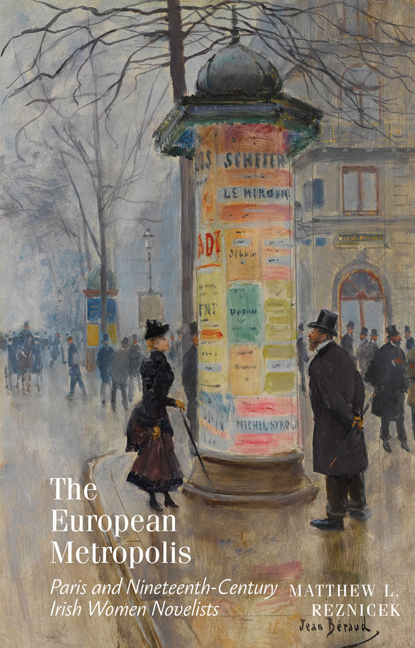Book contents
- Frontmatter
- Contents
- Acknowledgments
- Dedication
- Parvenir: An Introduction
- The Novice in the City: Sydney Owenson and the Bildung of Metropolitan Economics
- Much More than Only Le Bel Irlandois: Metropolitan Socioeconomics and Parisian Bildung in Maria Edgeworth's Ormond
- The New Jerusalem and the Rue Vavin: Urban Space, Economic Exchange, and Gendered Modernity in French Leave
- First Life-and then Fame: Gendered Fin-de-Siècle Cityscapes in Max
- A City She Must Postpone: A Conclusion
- Notes
- Works Cited
- Index
Parvenir: An Introduction
- Frontmatter
- Contents
- Acknowledgments
- Dedication
- Parvenir: An Introduction
- The Novice in the City: Sydney Owenson and the Bildung of Metropolitan Economics
- Much More than Only Le Bel Irlandois: Metropolitan Socioeconomics and Parisian Bildung in Maria Edgeworth's Ormond
- The New Jerusalem and the Rue Vavin: Urban Space, Economic Exchange, and Gendered Modernity in French Leave
- First Life-and then Fame: Gendered Fin-de-Siècle Cityscapes in Max
- A City She Must Postpone: A Conclusion
- Notes
- Works Cited
- Index
Summary
As the body of Jean-Joachim Goriot, better known as Old Goriot, is lowered to its resting place in Père Lachaise in the twentieth arrondissement of Paris, Eugène Rastignac stares despondently into the grave. Instead of attending their father's funeral, Goriot's daughters send two empty carriages and, when the gravediggers demand their tip, Rastignac must borrow five francs to oblige them. These final moments of indifference overwhelm Balzac's protagonist as “a wave of desperate depression” sweeps over him. Then, defiantly, he climbs “to the higher part of the cemetery, and [sees] Paris spread out along the winding banks of the Seine” and here he declares war between himself and the city; eying “almost hungrily” that area “between the column in the place Vendôme and the dome of the Invalides, home to that fashionable society to which he had sought to gain admission,” he declares “the epic challenge: ‘It's between the two of us now.’” This proclamation of war between Rastignac and the French capital sets the stage for a great deal of nineteenth-century writing about Paris; it highlights the city's indifference to the individual, the role of economics in determining one's position within the city, and, ultimately, the frustrating attempts to achieve and to articulate a specific sense of selfhood in the urban landscape of the French capital of the nineteenth century.
Balzac's Père Goriot, along with the rest of his Comédie humaine, demonstrates the centrality of Paris to nineteenth-century literature and presages the French capital's centrality in the development of urban studies. To say that the nineteenth-century novel could not exist without Paris is not hyperbole. From the dawn of the nineteenth century and Burke's Reflections on the Revolution in France, in which Paris occupies center stage, to mid-century and Balzac's attempts to place “modernity under the microscope” in the Comédie humaine, the influence of Paris is omnipresent in the literature of the long nineteenth century, whether that literature is celebrating or castigating the city. The French capital created the protagonist who would dominate the nineteenth-century novel. Scholars like Walter Benjamin, David Harvey, and Franco Moretti all recognize Paris as “the capital of modernity” and the “capital of the nineteenth century,” rejecting the centrality of London, in Moretti's words, “the ‘workshop of the world’, and of the Empire.”
- Type
- Chapter
- Information
- The European MetropolisParis and Nineteenth-Century Irish Women Novelists, pp. 1 - 24Publisher: Liverpool University PressPrint publication year: 2017



